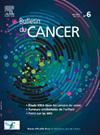Thérapies ciblées et immunothérapie : positionnement dans le champ de l’innovation et enjeux pour le processus de décision thérapeutique
IF 1.1
4区 医学
Q4 ONCOLOGY
引用次数: 0
Abstract
La meilleure compréhension des mécanismes moléculaires, cellulaires et immunologiques du cancer a conduit au développement des thérapies ciblées, puis de l’immunothérapie, ce qui a changé la manière d’appréhender le traitement du cancer. Si ces traitements se différencient de la chimiothérapie par leurs mécanismes d’action, ils permettent également d’aboutir à une personnalisation accrue de la prise en charge du cancer grâce au développement des technologies permettant de cibler de manière plus fine les patients. Ils sont cependant associés à plusieurs défis : la gestion de l’incertitude associée à leur balance bénéfice–risque liée au manque de recul et parfois de preuves scientifiques sur leurs effets ; la complexité à intégrer les données moléculaires et immunologiques dans la décision thérapeutique ; le défi des inégalités d’accès à ces traitements souvent considérés comme révolutionnaires du fait de la caractérisation moléculaire requise et/ou des conditions d’inclusion dans les essais de phase précoce ; et le défi de leur appropriation et leur adoption par les médecins et les patients. Cette revue narrative explore chacun de ces défis dans le cadre du processus de décision partagée dont la promotion est un gage de qualité et de sécurité des soins pour le patient atteint de cancer.
The better understanding of the molecular, cellular, and immunological mechanisms of cancer has led to the development of targeted therapies, then immunotherapy, which have changed the approach to cancer treatment. While these treatments differ from chemotherapy in their mechanisms of action, they also allow for increased personalization of cancer care through the development of technologies that target patients more precisely. However, they are associated with several challenges: the management of uncertainty associated with their risk–benefit balance due to the lack of long-term data and sometimes scientific evidence on their effects; the complexity of integrating molecular and immunological data into the therapeutic decision; the challenge of inequalities in access to these treatments often considered revolutionary due to the required molecular characterization and/or inclusion criteria for early-phase trials; and the challenge of their appropriation and adoption by physicians and patients. This narrative review explores each of these challenges in the context of shared decision-making, the promotion of which is a guarantee of quality and safety of care for cancer patients.
[靶向疗法和免疫疗法:创新领域的定位和治疗决策过程中的挑战]。
随着人们对癌症的分子、细胞和免疫机制有了更深入的了解,靶向疗法和免疫疗法相继问世,改变了癌症治疗的方法。虽然这些疗法在作用机制上与化疗不同,但通过开发更精确地针对患者的技术,它们也使癌症治疗更加个性化。然而,它们也面临着一些挑战:由于缺乏长期数据,有时也缺乏科学证据来证明其疗效,因此需要管理与风险-效益平衡相关的不确定性;将分子和免疫学数据整合到治疗决策中的复杂性;由于早期阶段试验所需的分子特征描述和/或纳入标准,在获得这些通常被认为是革命性的治疗方法方面存在不平等现象;以及医生和患者对它们的应用和采纳所面临的挑战。这篇叙述性综述从共同决策的角度探讨了这些挑战,共同决策是癌症患者医疗质量和安全的保障。
本文章由计算机程序翻译,如有差异,请以英文原文为准。
求助全文
约1分钟内获得全文
求助全文
来源期刊

Bulletin Du Cancer
医学-肿瘤学
CiteScore
1.90
自引率
16.70%
发文量
224
审稿时长
37 days
期刊介绍:
Without doubt, the ''Bulletin du Cancer'' is the French language publication of reference in the field of cancerology. Official organ of the French Society of Cancer, this journal covers all the information available, whether in the form of original articles or review articles, but also clinical cases and letters to the editor, including various disciplines as onco-hematology, solids tumors, medical oncology, pharmacology, epidemiology, biology as well as fundamental research in cancerology. The journal proposes a clinical and therapeutic approach of high scientific standard and regular updates in knowledge are thus made possible. Articles can be submitted in French or English.
 求助内容:
求助内容: 应助结果提醒方式:
应助结果提醒方式:


